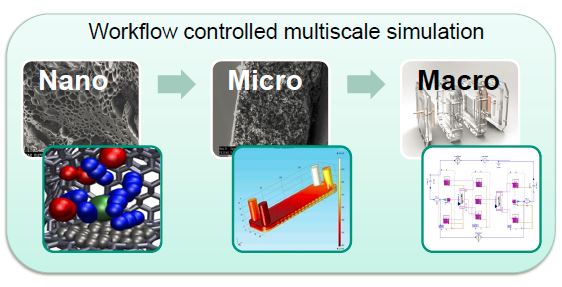Design of tailored, tunable carbon materials for bioseparation of nucleic acids

The aim of the project is the simulation based design of tailored, tunable carbon materials for bioseparation of nucleic acids, the experimental validation of the predicted results and finally the construction of a new generation of parallelized, potential controlled separation devices which allow fast and easy DNA extraction from cell lysates. For this purpose, a multi-scale simulation of the interaction of large biomolecules with highly hierarchical 3D-structure with an electrically charged carbon material, which itself has a complex porous structure and surface chemistry, will be developed. The core of the model will be a comprehensive digital representation of the carbon material and the oligonucleotides, delivering the required structural data and interaction parameters to derive equilibrium and kinetic model modules for implementation into finite element (FEM) based simulation tools. At the FEM level we will be able to predict the behavior of complete devices, like e.g. particle filled columns or wall coated capillaries in microfluidic chips. Based on model derived new materials we hope to replace current DNA separation techniques with chemical process control, by physically controllable processes with tunable electrical potential of the carbon material. This will greatly reduce the need for different buffer solutions and drastically simplify the parallel operation of a large number of samples.
| Name | Institute |
|---|---|
| Institute of Functional Interfaces (IFG) | |
| Matthias Franzreb | Institute of Functional Interfaces (IFG) |
| Wolfgang Wenzel | Institute of Nanotechnology (INT) |

